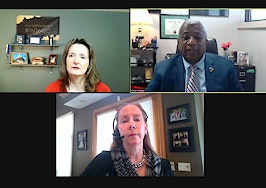Those attempting to attack the real estate agent commission structure are cloaking their true intentions in misleading claims of consumerism. These class action attorneys and those illegitimately trying to position themselves in the real estate market are looking for a payout if they can confuse enough people with misinformation and glaring omissions.
The reality is that the commission structure gives everyday Americans and small businesses critical advantages they otherwise wouldn’t get. Here’s what these self-serving parties are attacking.
They’re attacking a structure that makes it possible for more people to realize the American dream of homeownership.
The traditional commission structure where the listing broker offers to share his or her commission with the buyer broker ensures greater equity and equality for first-time, low-income and many other homebuyers who otherwise couldn’t afford a home and professional representation.
If buyers had no choice but to pay an out-of-pocket commission to their agent at closing in addition to the price of the home, it would increase their costs and as a result, freeze out of the market many first-time and other buyers.
It also would have a considerable impact on those who have been saving for a home, as they would discover they must incur an unexpected additional expense. Paying commissions out of the proceeds of the sale removes a key cost hurdle for buyers — 24 percent of whom in 2020 already had to delay purchasing a home by more than five years because of the potential debt and 31 percent of whom were first-time homebuyers. And unlike the purchase price, the payment to the broker could not be rolled into the mortgage and financed.
The associated multiple listing service (MLS) database and system is also designed to incentivize cooperation between brokers who share all their information in one place, providing the best and greatest number of options for buyers as efficiently and transparently as possible.
In turn, sellers also get access to the largest possible pool of buyers within a market because their listing broker will cooperate with all the buyers’ brokers to achieve the best offer.
They’re attacking the value of commissions that level the playing field for buyers and pay everyday Americans for a critical service.
A home is the single largest, most complex purchase most people make in a lifetime. Would you really suggest someone go that journey alone or with some inferior service? Of course, you need expert help — and consumers get that.
As internet research about a home purchase reached an all-time high of 97 percent in 2020, 9 in 10 people still chose to work with a real estate agent to buy a home. Agents level the playing field of knowledge for homebuyers, especially for those who are first-time and less well-financed consumers, something antagonists conveniently neglect to mention.
Real estate agents help people navigate complex, data-heavy and voluminous information, details and decisions. It could be easy to take what they do for granted, but it adds up to the benefit of homebuyers.
We’re talking coordinating with lenders, providing information on mortgage rates, managing attorney reviews, handling closings and advising on zoning, ordinances and regulations.
It also includes arranging appraisals and inspections, serving as a professional negotiator, ensuring clients get the best price and terms, advising on the latest trends or shifts in the local housing market and traffic, providing information about local, county and state property taxes, and navigating all required state and federal documents.
This is all done in today’s extremely competitive market with a record-low inventory of homes for sale, while helping buyers craft offers that stand out in ways other than offering the most money. All that for a median gross income of $49,700 for Realtors.
Consumers who don’t value these services don’t have to pay for them. The market already offers alternatives to the traditional broker model. However, consumers who do choose to engage a broker offering more complete services are getting real value in exchange, especially compared to consumers in foreign markets.
The consumer’s MLS system experience in the U.S. far surpasses other countries where, with rare exception, there is no MLS, and consumers are forced to rely on a few major brokerages, which creates a more fragmented and less competitive market.
They’re attacking small businesses that would not be able to participate and thrive without the cooperative MLS structure.
The MLS enables small businesses and innovation to flourish — all to the benefit of buyers and sellers. The advanced MLS technology enables publishers to have access to all the same information and provide the maximum number of options for consumers.
The cooperative broker MLS system also makes it possible for smaller brokerages to compete with larger ones. Within seconds of logging into an MLS, you have instant exposure and access to the largest, centralized database of residential real estate listings in your market.
By having all properties listed in one spot, even the smallest brokers have access to the same listings, information and pool of buyer brokers as the largest brokers.
Because of MLSs, we’re at a point in the market where we’re seeing unprecedented competition among brokers, especially when it comes to service and commission options. That gives consumers many different choices, including which customer service approach, broker and commission model they prefer.
And they’re attacking Realtors who go above and beyond to volunteer in and give to their local communities.
Realtor members of the National Association of Realtors (NAR) are not just doing a job. They have an unusually strong commitment to helping the communities in which they work.
In 2020, 79 percent of broker-owners volunteered their time on a monthly basis, and 92 percent made monetary donations. Meanwhile, 82 percent of Realtors made charitable donations, and 91 percent of Realtor associations conducted a fundraiser for their community in 2020.
Over the past 18 years, the Realtors Relief Foundation has collected and distributed more than $32 million in relief aid for victims of more than 80 disasters in 39 states and territories, helping more than 13,000 families. Every dollar goes directly to victims of disaster, and the NAR covers 100 percent of administrative expenses.
Realtors also are actively advocating for homeownership and property rights. NAR’s Housing Opportunity Program offers programs, grants, trainings and resources that help Realtors and Realtor associations expand housing availability, and ensure an adequate supply of rental housing and homeownership opportunities in their communities.
Moreover, NAR has a proud history of working with veterans’ groups, specifically the VA Home Loan Guaranty Program, to help veterans achieve the American dream of homeownership.
So, when big money plaintiff’s attorneys and those illegitimately trying to position themselves in the real estate market attack real estate agents and the associated commission structure, let’s be really clear about who and what they’re attacking.
They’re attacking everyday Americans embedded in our communities across the country who are helping their fellow, everyday Americans achieve the ultimate American dream — owning a home. And let’s be clear why they attack — for a payout.
Charlie Oppler is the president of the National Association of Realtors in Franklin Lakes, New Jersey.






